Space
Sign up for our newsletter
We summarize the week's scientific breakthroughs every Thursday.
-
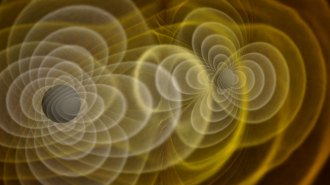 Space
SpaceRecoiling black holes could move at nearly one-tenth the speed of light
Knowing black holes’ speed after being kicked by gravitational waves can reveal how much energy converging black holes can release.
By Nikk Ogasa -
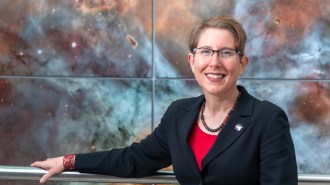 Astronomy
AstronomyMeet Jane Rigby, senior project scientist for JWST and advocate for LGBTQ+ astronomers
Rigby, senior project scientist for the James Webb Space Telescope, believes being part of the LGBTQ+ community has made her a better astronomer.
-
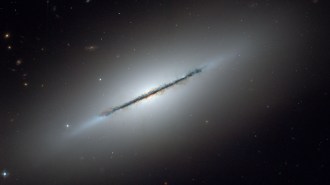 Astronomy
AstronomySpiral galaxies might have been lentil-shaped before becoming starry whirls
By using black holes to track how galaxies merge and grow, an astronomer has proposed an update to the prevailing story of how galaxy shapes evolve.
By Elise Cutts -
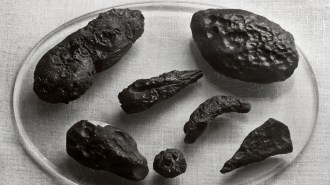 Earth
Earth50 years ago, mysterious glass hinted at Earth’s violent past
Like Hansel and Gretel followed a trail of breadcrumbs, scientists have followed tektites to the sites of major meteorite impacts.
By Demian Perry -
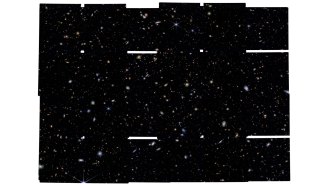 Space
SpaceThe James Webb telescope may have spotted stars powered by dark matter
Three objects in the distant universe bear signs of hypothesized “dark stars,” researchers claim, though others say more definitive data are needed.
By Skyler Ware -
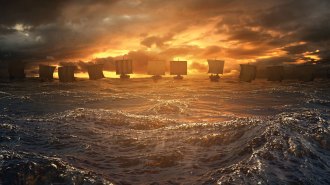 Archaeology
ArchaeologyHow an ancient solar flare illuminated the start of the Viking Age
Improved radiocarbon dating aided by a solar flare in the year 775 sheds light on the early days of Vikings and global trading in medieval times.
-
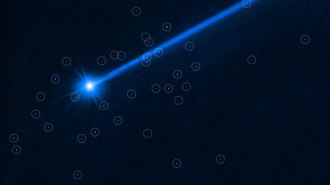 Planetary Science
Planetary ScienceNASA’s DART mission lofted a swarm of boulders into space
Hubble telescope images of the asteroid Dimorphos reveal a halo of 37 dim, newfound objects — most likely boulders shaken loose from the surface.
By Sid Perkins -
 Physics
PhysicsCenturies on, Newton’s gravitational constant still can’t be pinned down
A new experiment could finally answer the question 'What is the strength of gravity?' But it's a hard test to do.
-
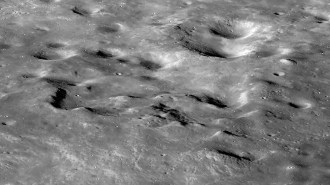 Planetary Science
Planetary ScienceGranite likely lurks beneath the moon’s surface
Without plate tectonics or water, granite is hard to make. But a 50-kilometer-wide hunk sits beneath the moon’s surface, lunar orbiter data suggest.
-
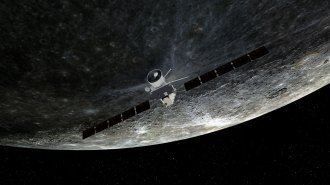 Planetary Science
Planetary ScienceA rain of electrons causes Mercury’s X-ray auroras
The first direct measurement of electrons raining down on Mercury suggests this particle precipitation causes most auroras in the solar system.
By Elise Cutts -
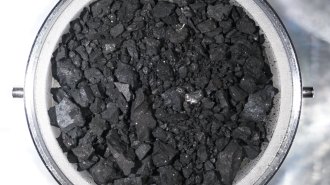 Astronomy
AstronomyRyugu asteroid samples are sprinkled with stardust older than the solar system
Slivers of the asteroid appear to be from the fringes of the solar system and could reveal bits of the history of the sun and its planets.
-
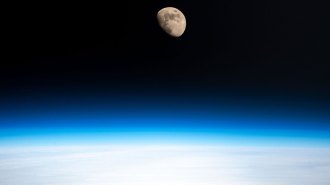 Physics
PhysicsMass has different definitions. The moon’s orbit confirms two are equivalent
Laser measurements of the moon’s orbit square with Newton’s third law of motion and Einstein’s theory of gravity.